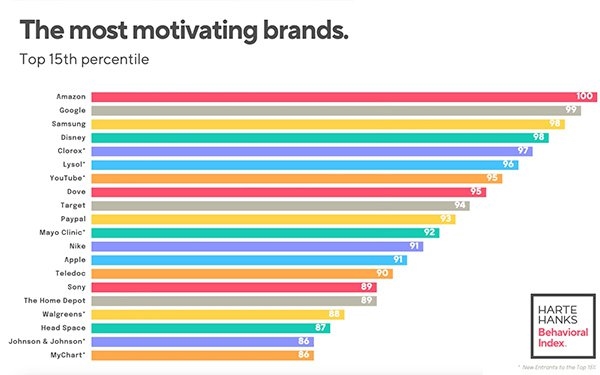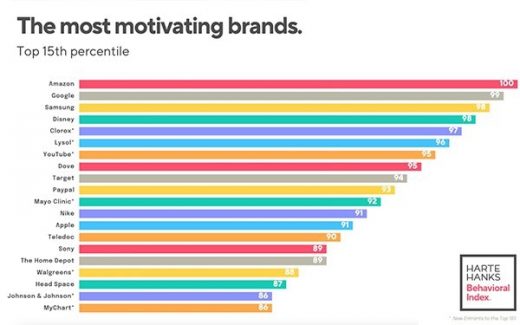Consumers Reboot, From Brands To Relationships, Data Shows
Consumers Reboot, From Brands To Relationships, Data Shows

Emotions and content are key to understanding consumer emotion and behavior. A Harte Hanks study released Monday shows that as more vaccines are distributed, people have begun to bounce back from lockdown fatigue and frustration.
Consumers feel more hopeful and ready to leave isolation.
The data pulled between February 11 and March 11 focuses on relationships and the consumer’s “current emotional state of mind,” but it clearly links the relationship between well being and consumer spending habits.
About 2,637 people were surveyed, and 125 brands indexed, as well as 10 brand diagnostics behavioral metrics and marketing drivers, analyzing 1 billion social and search behaviors.
“This is the dawn of a new phase of human behavior,” said Gretchen Ramsey, chief strategy officer at Harte Hanks, calling it a “massive reset.”
When it comes to brands, 35% of respondents believe the COVID-19 pandemic has made them much more mindful of the brands they choose. Some 76% now look for quality in a brand, and 70% want affordability. Some 68% look for reliability, while 56% look for honesty, and 40% want to protect people’s health, which may be why certain brands like Target, Teladoc, and Amazon continue to rank highly among customers.
“Our brains change when we are hopeful,” said Ramsey. “We’re more cognitively flexible, deal better with novel situations and can make decisions more quickly. Hopeful brains have momentum and unconsciously shape the future they want. When we’re hopeful we ‘see the future,’ and unconsciously behave in a way to make that future a reality.”
Ramsey said the data shows a direct correlation to what consumers buy and how they spend. Planning behaviors are up for post-vaccine vacations, family get-togethers, new backyards to host those get-togethers, and entertainment outside the home. Included within that planning are major purchases, such as tickets and renovations, as well as micro-purchases, such as new outfits for these events and food and beverage to fuel them, she said.
Most people spend money when feeling positive. Respondents to the survey indicated they rated themselves a 73 on a scale of 0 (anger) to 100 (joy). This score reflects a strong lean toward a “hopeful” emotional state of mind for the first time in the past year compared to its September score of 64.
Look at the data from the perspective of consumers’ spending habits. If consumers spend when they feel secure and happy, this might explain the large number of cars in the parking lot of South Coast Plaza in southern California. Fully vaccinated, I walked in to look around. People were spending.
Expectations around the impact of the vaccine on their lives are very high among those surveyed. The data shows a 44% increase in mindset of those feeling joy, and a 22% increase in those feeling hopeful since September. Conversely, there has been an 18% decrease in those feeling uncertainty, a 27% decrease in feelings of fear, and a 45% decrease in feelings of anger since September.
Women are more likely to talk about what has been lost over the past year, such as jobs and financial opportunities, compared with men. Key concerns include the impact of schools being closed or only partially open, and its effect on their child’s education; as well as the loss of jobs or career opportunities.
Millennials are 24% more likely to feel optimistic about business travel, 23% more optimistic about their finances, 16% more optimistic about their mental health, and 15% more optimistic about their shopping habits than other population segments.
About 25% of Gen Z are more fearful than Millennials when it comes to isolation and other challenges that keep them away from their friends.
“If you as a brand are dealing with Gen Z, think about how you can get closer to them, because this is the generation that needs it the most,” Ramsey said.
Whether it’s a new relationship, new product or new experience, survey respondents are ready for new things in their lives. In fact, 42% say they are much more likely to try new things than they were a few months ago, representing a 17-point increase from the most recent study findings in the fall.
Some 57% of respondents want to exercise more and eat healthy. About 56% are looking for new ways to keep their family healthy. Another 41% are hopeful that the vaccine’s rollout will enable them to improve their mental health.
One-third of respondents want to be kinder to people around them, 35% want to get more sleep, 34% want to keep in closer touch with friends and family, and 31% want to stand up for what they believe in.
(21)


